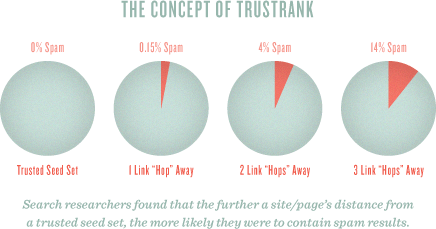growing-popularity-and-links
For search engines that crawl the vast metropolis of
the web, links are the streets between pages. Using sophisticated link
analysis, the engines can discover how pages are related to each other
and in what ways.
Since the late 1990s search engines have treated links as votes for
popularity and importance in the ongoing democratic opinion poll of the
web. The engines themselves have refined the use of link data to a fine
art, and use complex algorithms to perform nuanced evaluations of sites
and pages based on this information.
Links aren't everything in SEO, but search professionals attribute a
large portion of the engines' algorithms to link-related factors (see Search Engine Ranking Factors).
Through links, engines can not only analyze the popularity websites and
pages based on the number and popularity of pages linking to them, but
also metrics like trust, spam, and authority. Trustworthy sites tend to
link to other trusted sites, while spammy sites receive very few links
from trusted sources (see MozTrust). Authority models, like those postulated in the Hilltop Algorithm, suggest that links are a very good way of identifying expert documents on a given subject.


Link Signals
Used by search engines
How do search engines assign value to links? To answer this, we need
to explore the individual elements of a link, and look at how the search
engines assess these elements. We don't fully understand the
proprietary metrics that search engines use, but through analysis of
patent applications, years of experience, and hands-on testing, we can
draw some intelligent assumptions that hold up in the real world. Below
is a list of notable factors worthy of consideration. These signals, and
many more, are considered by professional SEOs when measuring link
value and a site's link profile. You may also enjoy some further on the
Moz Blog reading about search engine valuation of links.
Global Popularity
The more popular and important a site is, the more links from that site matter. A site like Wikipedia
has thousands of diverse sites linking to it, which means it's probably
a popular and important site. To earn trust and authority with the
engines, you'll need the help of other link partners. The more popular,
the better.
Local/Topic-Specific Popularity
The concept of "local" popularity, first pioneered by the Teoma
search engine, suggests that links from sites within a topic-specific
community matter more than links from general or off-topic sites. For
example, if your website sells dog houses, a link from the Society of
Dog Breeders matters much more than one from a site about roller
skating.
Anchor Text
One of the strongest signals the engines use in rankings is anchor text.
If dozens of links point to a page with the right keywords, that page
has a very good probability of ranking well for the targeted phrase in
that anchor text. You can see examples of this in action with searches
like "click here," where many results rank solely due to the anchor text of inbound links.
TrustRank
It's no surprise that the Internet contains massive amounts of spam.
Some estimate as much as 60% of the web's pages are spam. In order to
weed out this irrelevant content, search engines use systems for
measuring trust, many of which are based on the link graph. Earning
links from highly-trusted domains can result in a significant boost to
this scoring metric. Universities, government websites and non-profit
organizations represent examples of high-trust domains.
Link Neighborhood
Spam links often go both ways. A website that links to spam is likely
spam itself, and in turn often has many spam sites linking back to it.
By looking at these links in the aggregate, search engines can
understand the "link neighborhood" in which your website exists. Thus,
it's wise to choose those sites you link to carefully and be equally
selective with the sites you attempt to earn links from.
Freshness
Link signals tend to decay over time. Sites that were once popular
often go stale, and eventually fail to earn new links. Thus, it's
important to continue earning additional links over time. Commonly
referred to as "FreshRank," search engines use the freshness signals of links to judge current popularity and relevance.
Social Sharing
The last few years have seen an explosion in the amount of content
shared through social services such as Facebook, Twitter, and Google+.
Although search engines treat socially shared links differently than
other types of links, they notice them nonetheless. There is much debate
among search professionals as to how exactly search engines factor
social link signals into their algorithms, but there is no denying the
rising importance of social channels.

The Power of Social Sharing
How Google+, Twitter, and Facebook Change the Game
The years 2011-2012 saw a huge rise in social sharing and its effects
on search. Google, in particular, began to incorporate a huge number of
social signals into its search results. This involves serving
personalized results to logged-in users that include content shared by
the searcher's social circle (Facebook, Twitter and others). These
results might not always appear in the top ten, but are undoubtedly
promoted due to this social influence.
The potential power of this shift towards social for search marketers
is huge. Someone with a large social circle, who shares a lot of
material, is more likely to see that material (and her face) promoted in
search results. For publishers, it's beneficial to have your content
shared by these highly influential folks with large social followings.
For Google searches, this is especially true of content shared on
Google+.
Are Social Shares the Same as Links?
In a word: no. Although there is evidence
that social shares such as Tweets, Likes, and Plusses affect rankings,
at this time links are considered a far superior and more lasting way to
promote the popularity of your content than any other method.
Link Building Basics
Link building is an art. It's almost always the most challenging part
of an SEO's job, but also the one most critical to success. Link
building requires creativity, hustle, and often, a budget. No two link
building campaigns are the same, and the way you choose to build links
depends as much upon your website as it does your personality. Below are
three basic types of link acquisition.

- "Natural" Editorial LinksLinks
that are given naturally by sites and pages that want to link to your
content or company. These links require no specific action from the SEO,
other than the creation of worthy material (great content) and the
ability to create awareness about it.
- Manual "Outreach" Link BuildingThe
SEO creates these links by emailing bloggers for links, submitting
sites to directories, or paying for listings of any kind. The SEO often
creates a value proposition by explaining to the link target why
creating the link is in their best interest. Examples include filling
out forms for submissions to a website award program or convincing a
professor that your resource is worthy of inclusion on the public
syllabus.
- Self-Created, Non-EditorialHundreds
of thousands of websites offer any visitor the opportunity to create
links through guest book signings, forum signatures, blog comments, or
user profiles. These links offer the lowest value, but can, in the
aggregate, still have an impact for some sites. In general, search
engines continue to devalue most of these types of links, and have been
known to penalize sites that pursue these links aggressively. Today,
these types of links are often considered spammy and should be pursued
with caution.
It's up
to you, as an SEO, to select which of these will have the highest return
on the effort invested. As a general rule, it's wise to build as vast
and varied a link profile as possible, as this brings the best search
engine results. Any link building pattern that appears non-standard,
unnatural, or manipulative will eventually become a target for advancing
search algorithms to discount.
As with any marketing activity, the first step in any link building
campaign is the creation of goals and strategies. Unfortunately, link
building is one of the most difficult activities to measure. Although
the engines internally weigh each link with precise, mathematical
metrics, it's impossible for those on the outside to access this
information.
SEOs rely on a number of signals to help build a rating scale of link
value. Along with the data from the link signals mentioned above,
these metrics include the following:
Ranking for Relevant Search Terms
One of the best ways to determine how highly a search engine values a
given page is to search for some of the keywords and phrases that page
targets (particularly those in the title tag
and headline). For example, if you are trying to rank for the phrase
"dog kennel," earning links from pages that already rank for this phrase
would help significantly.
MozRank
MozRank (mR) shows
how popular a given web page is on the web. Pages with high MozRank
scores tend to rank better. The more links to a given page, the more
popular it becomes. Links from important pages (like www.cnn.com or
www.irs.gov) increase a page's popularity, and subsequently its MozRank,
more than unpopular websites.
A page's MozRank can be improved by getting lots of links from semi-popular pages, or a few links from very popular pages.
Domain Authority
Moz Domain Authority
(or DA) is a query-independent measure of how likely a domain is to
rank for any given query. DA is calculated by analyzing the Internet's
domain graph and comparing a given domain to tens of thousands of
queries in Google.
Competitor's Backlinks
By examining the backlinks (inbound links) of a website that already
ranks well for your targeted keyword phrase, you gain valuable
intelligence about the links that help them achieve this ranking. Using
tools like Open Site Explorer, SEOs can discover these links and target these domains in their own link building campaigns.
Number of Links on a Page
According to the original PageRank formula,
the value that a link passes is diluted by the presence of other links
on a page. Thus, all other things being equal, being linked to by a page
with few links is better than being linked to by a page with many
links. The degree to which this is relevant is unknowable (in our
testing, it appears to be important, but not overwhelmingly so), but
it's certainly something to be aware of as you conduct your link
acquisition campaign.
Potential Referral Traffic
Link building should never be solely about search engines. Links that
send high amounts of direct click-through traffic not only tend to
provide better search engine value for rankings, but also send targeted,
valuable visitors to your site (the basic goal of all Internet
marketing). This is something you can estimate based on the numbers of
visits or page views according to site analytics. If you can't get
access to these, services like Google Trends can give you a rough idea of at least domain-wide traffic, although these estimates are known to be wildly inaccurate at times.
It takes time,
practice, and experience to build comfort with these variables as they
relate to search engine traffic. However, using your websites analytics,
you should be able to determine whether your campaign is successful.
Success comes when you see increases in
search traffic, higher rankings, more frequent search engine crawling
and increases in referring link traffic. If these metrics do not rise
after a successful link building campaign, it's possible you either need
to seek better quality link targets, or improve your on-page optimization.
Five Samples of Link Building Strategies
Get your customers to link to you
- If you have partners you work with regularly, or loyal customers
that love your brand, you can capitalize on this by sending out
partnership badges—graphic icons that link back to your site (like
Google often does with their AdWords certification program). Just as
you'd get customers wearing your t-shirts or sporting your bumper
stickers, links are the best way to accomplish the same feat on the web.
Check out this post on e-commerce links for more.
Build a company blog; make it a valuable, informative, and entertaining resource
- This content and link building strategy is so popular and valuable
that it's one of the few recommended personally by the engineers at
Google (for more on this, see articles at USA Today and Stone Temple).
Blogs have the unique ability to contribute fresh material on a
consistent basis, participate in conversations across the web, and earn
listings and links from other blogs, including blogrolls and blog
directories.
Create content that inspires viral sharing and natural linking
- In the SEO world, we often call this "linkbait." Good examples might include David Mihm's Local Search Ranking Factors, Compare the Meerkat, or the funny How Not To Clean a Window.
Each leverages aspects of usefulness, information dissemination, or
humor to create a viral effect. Users who see it once want to share it
with friends, and bloggers/tech-savvy webmasters who see it will often
do so through links. Such high quality, editorially earned votes are
invaluable to building trust, authority, and rankings potential.
Be newsworthy
- Earning the attention of the press, bloggers and news media is an
effective, time-honored way to earn links. Sometimes this is as simple
as giving away something for free, releasing a great new product, or stating something controversial.
|
|
|
|
The link building activities you engage in depend largely on the type of site you're working with.
For smaller sites, manual link building, including directories, link
requests, and link exchanges may be a part of the equation. With larger
sites, these tactics tend to fall flat and more scalable solutions are
required. Sample strategies are listed here, though this is by no means
an exhaustive list (see Moz's Blog Posts on Link Building for more).
Search for sites like yours by using keywords and phrases directly
relevant to your business. When you locate sites that aren't directly
competitive, email them, use their online forms, call them on the
phone, or even send them a letter by mail to start a conversation about
getting a link. Check out this blog post on link requests for more detail.
|
|
|
|
|

Show Me the Money
An aside on buying links
Google and Bing seek to discount the influence of paid links in their
organic search results. While it is impossible for them to detect and
discredit all paid links, the search engines put a lot of time and
resources into finding ways to detect these. Websites caught buying
links or participating in link schemes risk severe penalties that will
drop their rankings into oblivion. Notwithstanding these efforts, link
buying sometimes works; many search professionals wish the search
engines would do even more to discourage it.
We at Moz recommend spending your time on long-term link building strategies that focus on building links naturally.

 Link Signals
Link Signals 


